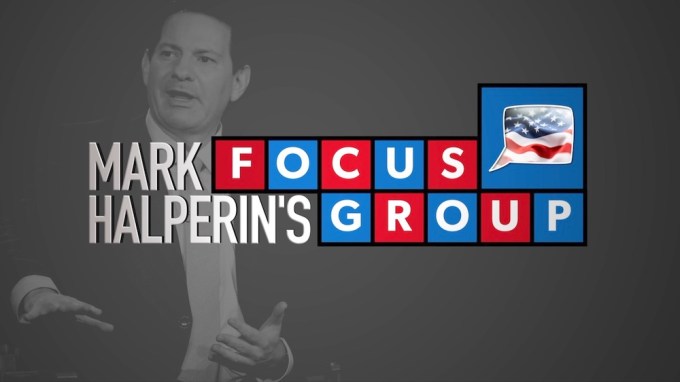Update, April 13: In this story, Walking Duck CEO Paul Wilke stated that Mark Halperin had apologized to the victims of his sexual harassment and misconduct, and that they accepted his apologies. While that may be true for some, we have subsequently heard from multiple people who identified themselves as Halperin’s victims and said that he has not apologized to them.
One of them (who previously signed letters to media outlets about Halperin’s behavior) said, “He has never reached out to me to apologize. And I can’t think of any scenario I could accept an apology after all these years he has denied everything I’ve said he did to me. He was violent and he was scary and I have to live with seeing him on my TV by accident and cross my computer screen and that makes my heart race and feel awful. If his business partner think[s] I’m okay with any of this, he’s wrong. And I know many many other women who are shocked that he would claim we have been given an apology, much less accepted it.”
TechCrunch should have fact-checked Wilke’s statement before publishing the initial post, and we apologize for our failure to do so.
Can any news organization bridge the separate realities that the left and right seem to occupy in U.S. politics? A new startup with the odd-yet-memorable name Walking Duck is going to try.
Walking Duck (an inversion of a “lame duck” president — a phrasing that has earned criticism as ableist — and a reference to the duck test) was founded by journalist Mark Halperin, as well as Paul and Audra Wilke, who are also backing it with their PR firm Upright Position Communications.
While the startup is producing a variety of content and events, including virtual town halls, there are three main pieces to the Walking Duck strategy at launch — the Walking Duck website, which aggregates news from other publications, usually focused on a few key stories for the day, with additional commentary; plus Halperin’s newsletter Wide World of News and his Newsmax show Mark Halperin’s Focus Group.
Halperin also serves as Walking Duck’s managing editor, and he said that he and the Wilkes have a shared vision for a publication that’s different from “the partisan media,” where “everything is cast through the lens of the red tribe or the blue tribe.”
And yes, aggregation is a key part of that vision, not just allowing the startup to cover national news with a relatively small team of five (for now), but also to offer different perspectives. In fact, Halperin argued that any news organization that’s being honest will admit that it’s doing aggregation.

Image Credits: Walking Duck
“Even if you have a big scoop about something, people want to know: What’s the reaction to the scoop, how is that scoop being treated elsewhere?” he said. “Aggregation can be smarter and faster and less ideological than exists in a lot of places. You can aggregate for everyone and elevate smart over angry.”
In my conversation with Halperin and Paul Wilke (Walking Duck’s CEO), I suggested that the “both sides” approach (which other new publications are also touting) has its limitations: When you’ve got a (now former) president seeking to undermine an election that he lost, and when his supporters violently storm the Capitol, simply presenting two sides of an argument as if they were equally valid seems insufficient.
“We don’t always try to show both sides, accuracy matters,” Wilke said. Similarly, Halperin said that it’s less about making sure there’s a 50-50 balance, and more about avoiding the limitations of a partisan lens. As an example, he argued that liberal outlets demonized former FBI director James Comey after his memo may have cost Hillary Clinton the 2016 election, then reversed course and valorized him after President Trump fired him.
“I think he should be covered on the individual incidents in a way that’s consistent,” Halperin said.
All of that might sound incongruous from a journalist with a show on Newsmax — which, far from being a center-of-the-road network, has attracted an audience by being more pro-Trump and more willing to spread election misinformation than Fox News. But Halperin and Wilke said that by creating a show that brings four Trump voters and four Biden voters (not professional pundits) from across the country together over Zoom and attempting to find common ground, they’re exposing conservative viewers to new points of view — and they’d be happy to do the same for liberals if the show was on MSNBC.
“Just go to any cable news network and try to find a show that’s talking to Trump voters and talking to Biden voters,” Halperin said. “We’re doing it every week. That’s the essence of trying to grapple with how do these two groups talk to each other.”
Halperin does have an existing relationship with Newsmax, which came after he lost his contracts at more mainstream networks following numerous accusations of sexual harassment.
When I brought up the accusations in my initial email correspondence with Wilke, he said, “[Mark’s] history is firmly in his past. He’s expressed remorse, been through counseling and has publicly (and privately) apologized to his victims, and they have … accepted his apologies. Additionally, Upright (my other company) is a PR firm that has more women than men, and we’re bringing some of them over to Walking Duck, and we discussed this issue with them and made sure they felt comfortable and knew that a safe workplace was a priority.”
I also broached the topic on our call, and Halperin said, “I recognize the expectations that people have. I’ve just continued to do my best to be a good colleague and a good professional. If people are willing to let me work, I appreciate the opportunities. But it’s up to them.”
